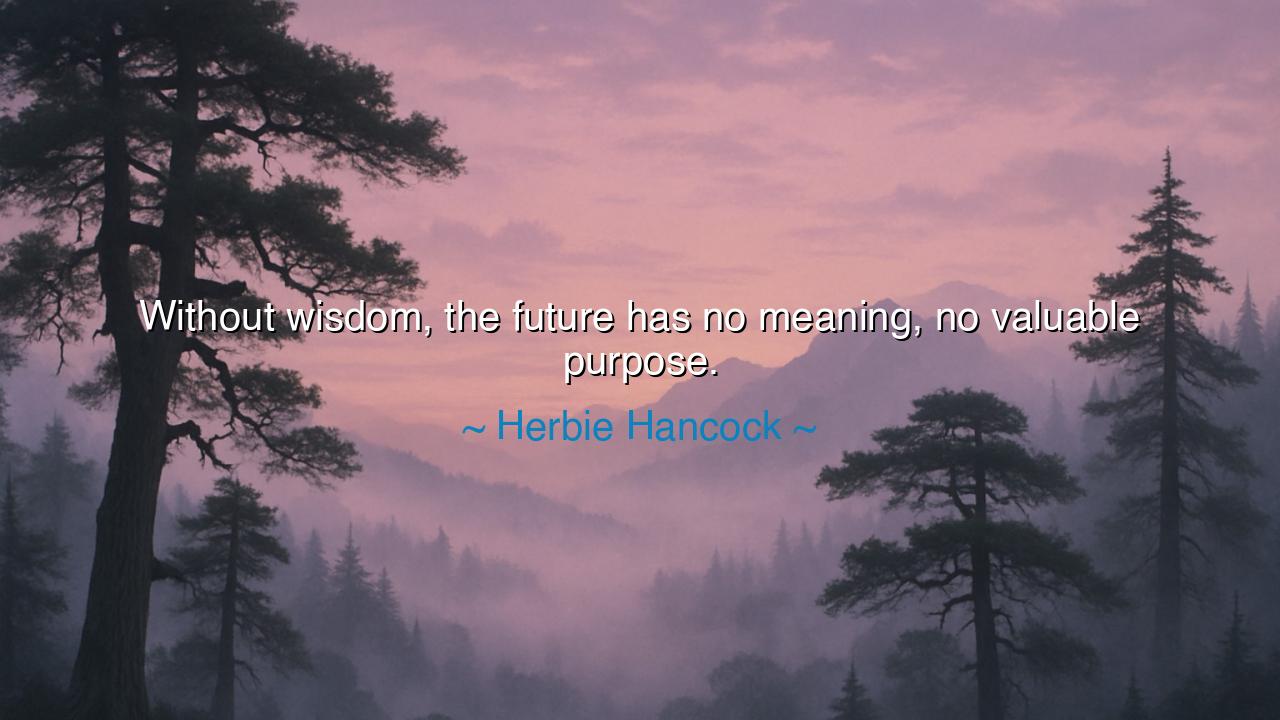
Without wisdom, the future has no meaning, no valuable purpose.






Herbie Hancock, though a master of music, speaks here with the cadence of the prophets: “Without wisdom, the future has no meaning, no valuable purpose.” These words strike like thunder across the ages, for they remind us that mere time, by itself, is empty. To march forward blindly is not progress, but wandering. Only when guided by wisdom does the future unfold into something luminous, rich with destiny and worth.
The future is a blank scroll, awaiting the marks we inscribe upon it. But if we write upon it without understanding, our works dissolve like dust in the wind. Wisdom is the ink that endures, the compass that keeps the traveler from circling endlessly in the desert of his own ambition. Without it, the greatest triumphs become hollow, the richest gains turn to ashes, and the march of time leads nowhere but into shadows.
History bears witness. Consider the mighty empire of Babylon, whose kings raised gardens to touch the heavens and walls to defy time itself. Yet, lacking wisdom, they sought only indulgence and pride. Their monuments crumbled, their language scattered, their greatness devoured by the sands. Contrast this with the wisdom of Solomon, whose prayer was not for wealth nor victory, but for discernment to govern well. His reign became a symbol of justice, harmony, and purpose—proof that wisdom alone gives meaning to power and secures a future worth inheriting.
Even in our modern age, this truth resounds. Hancock himself, as a musician, did not merely pursue notes or rhythms for their own sake. He sought to weave purpose into sound, to uplift souls, to bring unity where there was division. His art teaches us that the future of creativity, of culture, of humanity itself, is barren without wisdom to guide its direction. It is not enough to invent; one must also understand why, and for whom.
So let it be passed to the generations: seek wisdom first, before wealth, before fame, before conquest. For only wisdom can clothe the nakedness of tomorrow in meaning. Only wisdom makes the passing of days into a sacred journey, rather than a hollow drift toward oblivion. Remember, children of time: without wisdom, the future has no meaning, no valuable purpose—but with it, the future becomes a torch that lights the way for all who come after.






TNThanh Tuyen Nguyen
Hancock’s words imply that without wisdom, even well-planned goals may lack significance. I wonder if this also applies to collective efforts, such as politics or social movements. Can societies progress effectively without prioritizing wisdom, or do they risk repeating mistakes? It also leads me to think about education and mentorship: how can we foster wisdom in younger generations to ensure the future is not only productive but meaningful and ethically grounded?
TBTinh Bui
This quote makes me question how often society undervalues wisdom in favor of speed, innovation, or productivity. Can our achievements truly be meaningful without careful reflection and understanding? It also prompts me to consider personal responsibility: how much effort should we invest in cultivating wisdom to make the future worthwhile? Are there practical ways to integrate wisdom into daily decision-making so that the choices we make today shape a purposeful tomorrow?
NQNhat Quynh
I find this perspective both challenging and motivating. It implies that the mere passage of time or accumulation of experiences doesn’t guarantee a meaningful future. How do we intentionally develop wisdom to ensure our actions and choices have value? I’m also curious whether wisdom is always required for meaningful progress, or if moments of insight and creativity can also guide us effectively. How do different cultures understand the link between wisdom and purpose?
LLLong Le
This quote suggests that wisdom is the lens through which we interpret the future. But I wonder, is it possible to act meaningfully without it, relying instead on ambition or skill? Does wisdom involve foresight, moral judgment, or both? And how do we distinguish between knowledge that informs decisions and the deeper wisdom that gives life a sense of purpose? It makes me reflect on how we prepare for long-term consequences in a rapidly changing world.
TKVuong Tin Khai
Hancock’s statement makes me ponder the role of wisdom in shaping not just individual futures, but societal progress. Can a person or a community truly move forward without it? It raises the question of how we cultivate wisdom in a fast-paced world focused on immediate results. Are knowledge and experience sufficient, or is there something deeper, like reflection and ethical insight, that gives future actions meaning and purpose?